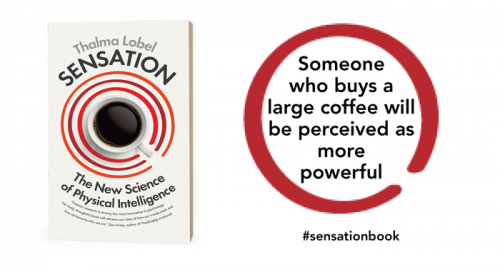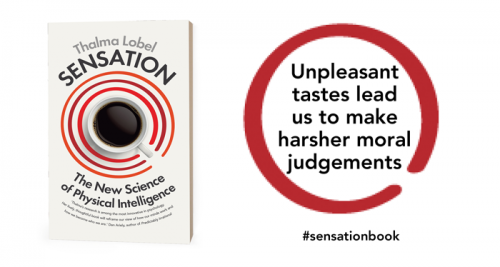We are unconsciously influenced in the most amazing ways

Sensation: the New Science of Physical Intelligence
by Thalma Lobel
I have very mixed feelings about this book. I will try to sort them out during this review, but apologies if it just comes off as a confused mess of thoughts!
Lobel is a psychologist who is interested in how our senses affect the way we think and links that to the way that we think metaphorically – a new area of psychology called “embodied cognition”. Sounds a bit complicated? Here are some examples to show how straightforward an idea it is: holding something warm makes us friendlier; the colour red makes us anxious; the smell of fish makes us feel suspicion. Yes, really.
The examples explored in the book vary quite a lot. Some of them seemed obvious to me (we equate weight and value, for instance), while others were surprising (touching something cold or hard makes us act more sternly). For me, Lobel certainly achieved her stated goal, which is to make readers question whether their senses are affecting their judgement. Am I agreeing to take on extra work because I’m holding a warm cup of tea? Am I choosing not to give money to that homeless person because they’re wearing black? Is that person genuinely good at their job or is it just that they’re tall?
“We are constantly exposed to environmental stimuli and cues…We experience much of our world quite consciously through our senses. But without noticing it, we are also unconsciously influenced in the most amazing ways by the physical experiences our senses convey. “
Which is all very interesting, and Lobel quotes a lot of studies rather than just making assertions. The training instilled in me by Ben Goldacre’s Bad Science blog meant I couldn’t help noticing that they’re mostly very small studies, but then it is a fairly new area of research and Lobel is careful to say when further studies back up the findings or when they are still needed.
Often, I found that a subject was obvious from one direction – that we think heavy things have more gravitas than light things, for example – but what was really interesting was when this was studied from the opposite direction. We estimate weights as heavier when they are somehow linked to a more serious subject (for instance a book deemed “important” compared with one that is supposedly random). We estimate heights as taller when the person is in a position of power. We perceive people as being nicer if they have a sweet tooth.
Despite the endless examples, Lobel has a very readable style. She is clearly excited by the science and manages to pass on her enthusiasm. She includes examples from books, films and TV as well as anecdotes from her own life to illustrate aspects of embodied cognition, which didn’t always hit the mark for me, but added personality and, coupled with her own involvement in this area of research, gave the book a personal touch.
“I had always thought of my grandfather as tall…In reality…he was on the shorter side of average. The pictures in my hands showed [this] but even then I checked with my mother to verify what my eyes were seeing. Even after learning that the grandfather I had always thought of as being tall was actually short, I still see him in my memory as towering over the rest of the family.”
My one problem with the book is possibly a problem I have with psychology in general – I don’t just want to know how behaviour is affected by sensory input, I want to why and this is only occasionally touched on. Lobel gets a bit defensive in an early chapter about psychology being considered a “soft science” but I can’t help observing that, compared with the other popular-science books I’ve read, this one was lacking that dogged search for the underlying truth, and I missed that.
I also want to know if these findings are universal or if they’re language-based. My guess would be that the link between red and danger and sex is universal, but the link between the smell of fish and feeling suspicion isn’t. But I want someone to tell me whether I’m right and why! Some of my questions were at least broached in the final chapter, but for the most part the answer was that more studies are needed, which I suppose is fair, but unsatisfactory.
It’s honestly a fascinating book and it has made me more aware of my sensory surroundings and how they might affect me.
Published 2014 by Icon Books.
Source: This book was kindly sent to me by the publisher in return for an honest review.
Challenges: This counts towards the 2014 Popular-Science Reading Challenge.
